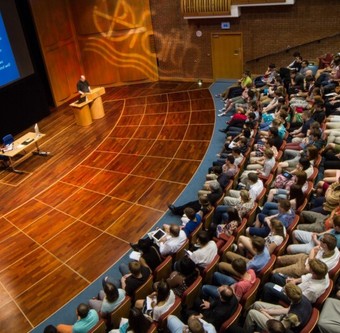
Editorial: Courage as we look ahead
Editorial:
08.01.20
Courage as we look ahead
It is not going to be easy being a Catholic bishop or priest in the Britain of the next few years. The combination of ignorance – most of the rising generation in Britain have very little first-hand knowledge or experience of the Christian faith – and of prejudice, in a social climate increasingly alert to the glee of denouncing anyone possibly guilty of having violated the rules of political correctness, make for a grim atmosphere.
Ignorance
The ignorance about the Church is massive. For large numbers of people, the only known facts about Catholic belief is that Catholics are against abortion and that the Church “hates gays”. There is very little general knowledge about the basic tenets of the Creed: God becoming man and living among us, dying and rising again and establishing for eternity the bond between humanity and God planned by God from “the beginning”.
All of that would be bad enough. But of course there is more. There is a general vague notion that “hundreds and hundreds” of Catholic priests have routinely subjected children to sexual abuse and that nothing has ever been done about it.
And in discussing the whole ghastly topic of sex abuse, the prospects of getting a fair hearing are not great. Nor should we complain about that: if the hearer assumes that we are going to defend evil behaviour, he is obviously not going to make much effort to listen to us. It is no use beginning the conversation by noting that the number of priests who have ever been involved in this evil is tiny – far smaller than in any other comparable profession. It just doesn’t matter. The retort will probably something along the lines of “one is one too many” – a cliché which, like most clichés, is true. It is crucial to establish that this evil behaviour shames the Church and is a source of penitence for every Catholic, and to seize the opportunity to get to the heart of things and note that we rightly call priests to a far higher standard than any one else, and ask why. We can then start talking about what a priest is, and whether or not there is a God, and why and how we know about good and evil, right and wrong. We can note in passing the truth that the number of priests who have been involved in this evil is tiny: but simply re-stating that will not help to get people nearer to Christ.
Action
In this climate, it is tempting to retreat and leave all evangelisation to others. A lack of action can be comfortably filled by criticising bishops, denouncing any missionary efforts as a waste of time, or gleefully reporting the latest depressing Mass attendance figures.
What line does the Faith Movement take? We run regular and well-attended youth events which have grown in number and in size over the 40-plus years of the Movement’s work, and we frequently and frankly discuss the Mass attendance figures and related statistics and invariably link this with specific and practical plans and actions for reversing the trend.
Above all, we show how the Faith can be presented in a scientific perspective with clarity, integrity and conviction.
Ideas
Within the Faith Movement, we have a range of ideas for that latter point. To take one example, the Editor takes issue with those who affirm that “all our Catholic schools are a waste of time – better to get rid of them”. For many young people, baptised into the Catholic Church but rarely attending Mass, a school could be one place where some contact may be made with a Catholic Faith that is otherwise completely alien to them. The Editor is aware of initiatives in Catholic schools that have included Rosary Clubs, Adoration of the Blessed Sacrament (“surprisingly popular” I was told “they seem to like the atmosphere”), talks on the plight of persecuted Christians, visits from religious sisters explaining their vocation and message, and meetings of “mini-vinnies” – the junior version of the St Vincent de Paul Society.
Reactions of pupils to Religious Education can be unexpected. The Editor recalls “Have you come to talk about abortion?” as being the first question asked by VI formers on three separate occasions when arriving to speak. The well-intentioned arrangements for having regular speakers on that subject had produced the assumption that this was the only subject on which the Church had anything to say. (It is good to be able to report that pupils at these and other schools have responded well to talks on, among other subjects, saints John Paul II and John Henry Newman, the Church’s calendar of feasts and seasons, ancient Marian shrines in England, and the story of how the Anglo-Saxons became Christian.)
The way ahead
The way ahead is evangelisation. We need prayerful Bishops who are courageous and give us clear leadership. We need good and holy priests. We need young men and women who are prepared to become RE teachers in Catholic schools. We need parish catechists who are prepared to be properly trained (the Maryvale Institute offers excellent courses).
It seems likely that there will be attempts to introduce legislation stating that priests must reveal what they hear in confession if it relates to any form of sexual abuse. But no Catholic priest can ever reveal what he hears in confession: and there have been those who have refused to do so, and have died because of that refusal. The Church cannot and will not ever suggest that there could be any change in that. As one bishop has recently put it: "The history of the Catholic Church has a number of people who’ve been put to death in defense of the seal of confession,It might come to that" . Courage will be needed in the years ahead.





